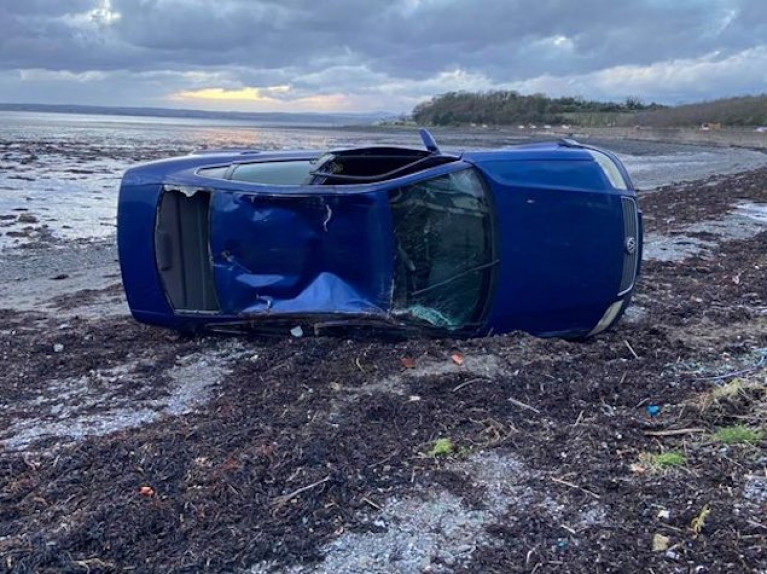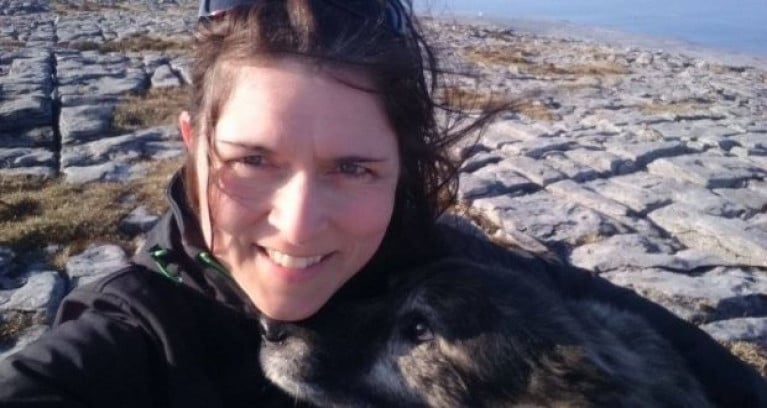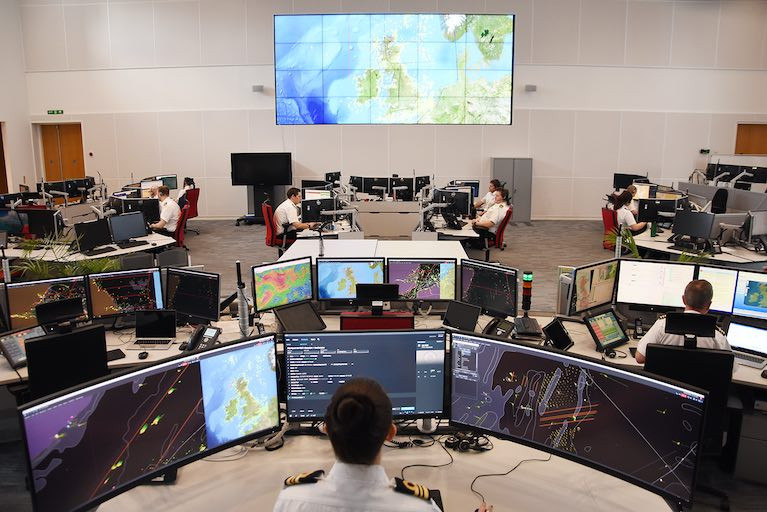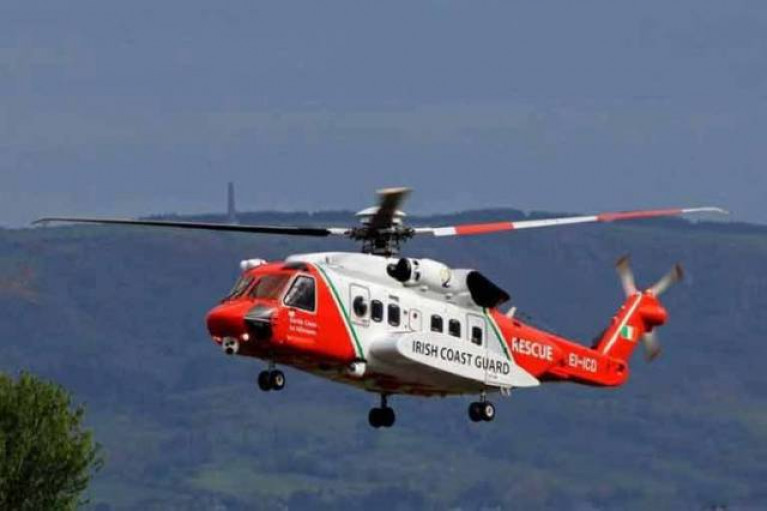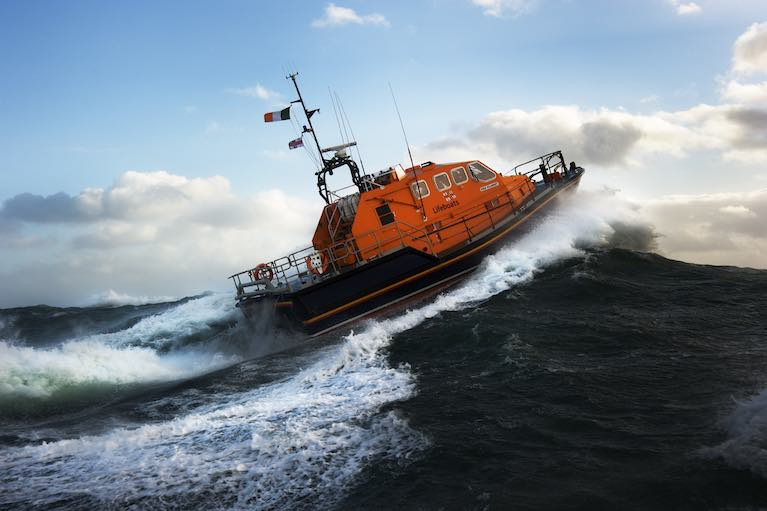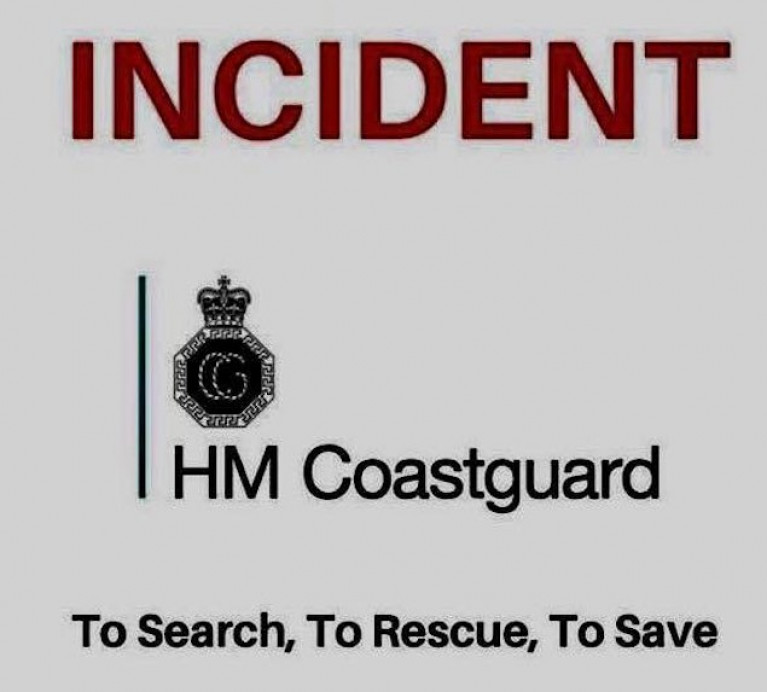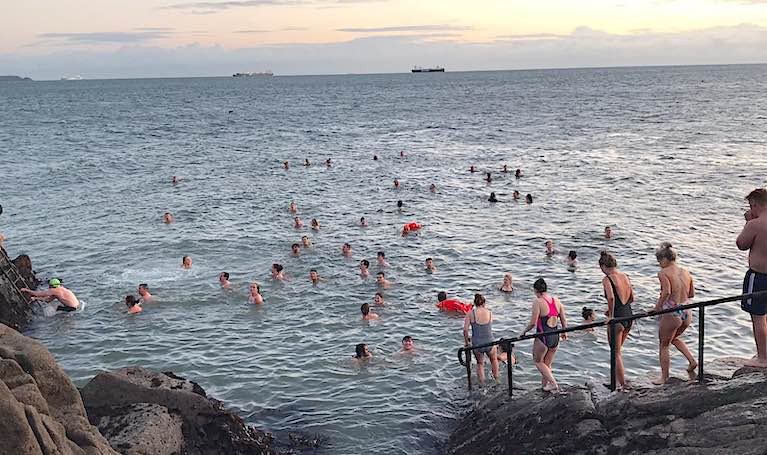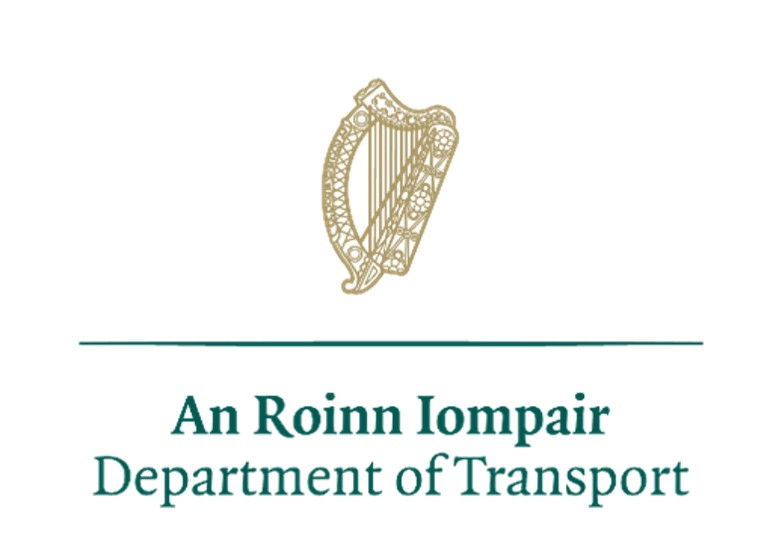Displaying items by tag: Coastguard
Tributes to Rescue 115 Airman Philip Wrenn for Winning Billy Deacon SAR Memorial Trophy
Tributes have been paid to Irish Coast Guard winchman Philip Wrenn who has won a prestigious award for his role in rescuing two Italian brothers from the Atlantic off the Aran island of Inis Mór two years ago.
Wrenn, CHC Ireland winch team member of the Irish Coast Guard Rescue 115 crew based at Shannon, won the Billy Deacon search and rescue memorial trophy 2020.
He was presented with it for his bravery in rescuing brothers Giovanni and Ricardo Zanon in very challenging conditions in 2019.
The Zanon brothers were visiting Poll na bPéist or the “Worm Hole”, the naturally shaped sea pool cut out of limestone on the west of Inis Mór, when they fell some 20 metres into the Atlantic.
Rescue 115 was tasked to the scene, and Wrenn and winch operator Ciarán McHugh worked as a team to take the two men from the sea.
Wrenn was tending to the more injured of the two men when a series of waves almost washed all three into Poll na bPéist’s cauldron.
Wrenn and McHugh were interviewed about for the rescue for the Midas Productions Irish Coast Guard documentary by Darina Clancy for TG4 television’s Tabú series.
“We went off into a holding pattern....then we saw this set of waves coming offshore...from about a mile away,” McHugh recalled.
“It was like you left someone off the side of the road to wait for the bus, and then the bus comes and slaps them,” McHugh told Tabú.
The two Italians were treated at University Hospital, Galway. They were reunited with Wrenn and McHugh for the documentary, which was broadcast on TG4 in March, 2020.
The trophy conferred on Wrenn is named in memory of late Bristow Helicopters winchman Billy Deacon, who died during a Maritime and Coastguard Agency search and rescue (SAR) helicopter mission in 1997.
It is awarded to winchmen and/or winch operators working in the British and Irish search and rescue regions, and the RNLI lifeboat operations director chairs the award committee.
Rescue 118 winch team member Gary Robertson won the award in 2017 for his rescue of a fisherman who had become tangled in a rope off Arranmore island, Co Donegal in April, 2016.
The fisherman’s six-metre vessel had sunk and he was clinging to a lifebuoy, when the Sligo-based helicopter was scrambled by Malin Head Coast Guard on April 9th, 2016.
“I am accepting this award on behalf of the whole team on Rescue 115. As a team, we work together to execute a rescue and I am only one member of that team,” Wrenn said.
Minister of State for Transport Hildegarde Naughton said Wrenn had demonstrated “a level of professionalism and commitment that I have no doubt is a great source of pride not alone to his immediate family but to anybody who is involved with search and rescue”.
She said the award not only honoured him but the “extraordinary work of our Coast Guard”.
Irish Coast Guard acting director Eugene Clonan said that Wrenn’s “selfless act of bravery exemplifies the actions of all Coast Guard activities in this area along with the county council lifeguards and declared resources of the RNLI and Community Inshore Rescue Service. “
CHC General Operations Manager Ireland manager Robert Tatten said the award – a piece of bog oak sculpted by Brendan Collum entitled “Entwined” –was very appropriate.
It “reminds us that all our lives are entwined, even with strangers we may not have yet met,” Tatten said.
“Philip saved two people he had never met at Inis Mor without thought for his own safety, but his experience and the intense training he and all CHC staff go through enabled him to make that rescue safely,” Tatten added.
Portaferry Coastguard Rescue team was joined by the Bangor team for joint mud and water rescue training in Strangford Lough on Sunday, 28th February.
The Dorn at Ardkeen was the location for the mud training. The word Dorn, from the Gaelic word for narrow channel, refers to the channel which connects several sheltered bays to the Lough near Ardkeen on the eastern side of the Lough.
Cook Street Quay in Portaferry town was used for the water rescue training.
 Mud rescue training in Strangford Lough
Mud rescue training in Strangford Lough
The Portaferry team said, "It is essential that we keep our skills up to the highest level possible, so when required to conduct a technical rescue, we provide a first-class service".
Belfast Coastguard Responds to Car on Beach
Belfast Coastguard Rescue Team responded yesterday (8th February) to reports of a car which had left the road near Newtownards Sailing Club, just a few miles outside the town on the loughshore road to Portaferry There were three people inside.
A coastal rescue officer from Portaferry was one of the first on the scene and had started casualty care before the arrival of a Rapid Response Vehicle (RRV) Paramedic. No serious injuries were reported.
PSNI and Coastguard personnel from Bangor helped with traffic management as well as checking that the vehicle was not leaking any fluids that could pollute the area. The team was free to stand down as recovery was arranged for the vehicle by the Police Service.
As reported in afloat.ie on 14th January, another vehicle left the same road a few miles farther south.
Bernard Lucas Calls for Reinvestigation into Death of His Wife & Irish Coast Guard Volunteer Caitriona Lucas
Irish Coast Guard volunteer Bernard Lucas has called for a re-investigation into the cause of his wife Caitriona’s death off the Clare coast in 2016.
In an interview with today’s Sunday Independent, Mr Lucas says he finds as “shocking” the criticisms of the Marine Casualty Investigation Board (MCIB) in a report commissioned by maritime lawyer Michael Kingston.
The report by Capt Neil Forde of Marine Hazard Ltd said the MCIB was “not fit for purpose”.
It was submitted by Mr Michael Kingston to several Oireachtas committees, including the Transport and Communications Network committee which sat on Friday last.
Ms Lucas (41), a librarian, mother of two, and advanced coxswain, had offered to help out the neighbouring Irish Coast Guard Kilkee unit in a search for a missing man on September 12th, 2016.
She hadn’t expected to go to sea, but the unit was short a crew member. She died after the Kilkee rigid inflatable boat (Rib) capsized in a shallow surf zone. Two other crew members survived.
Last summer, the Director of Public Prosecutions (DPP) decided that no criminal charges should be brought in relation to the incident after a report was forwarded to it by the Health and Safety Authority (HSA).
The unpublished HSA report was one of two separate investigations. The second report by the Marine Casualty Investigation Board (MCIB) proved so contentious that it had to be published in two parts, and the responses to the draft were longer than the report itself.
In a robust response, the Irish Coast Guard described the MCIB report as “flawed” and “misleading”, and argued that it was a “significant leap” to draw wider conclusions about safety standards based on one “tragic accident”.
In his submission to the draft report, Bernard Lucas queried why the investigation did not address failure to find personal locator beacons and other equipment issues, including the loss of helmets by three crew and the failure of lifejackets to inflate.
A postmortem identified a trauma to the side of Ms Lucas’s head at a point where it should have been protected by her helmet.
Last summer, the MCIB’s authority was questioned in a European Court of Justice judgment which found it is not independent as its board included the Department of Transport secretary-general, or his or her deputy, and the Marine Survey Office (MSO) chief surveyor. These two post holders have recently stood down.
The report commissioned by Mr Kingston claims the MCIB failed to investigate certain incidents which it has a statutory duty to inquire about, it questions its resources and independence.
It also says the MCIB inquiry into Caitriona Lucas’s death is “riddled with inaccuracies” – starting with the wrong location for the incident.
These inaccuracies were not corrected, even when highlighted in responses to the draft report, because MCIB investigators” simply have not had the resources required to do the job properly”, Mr Kingston told the Oireachtas Transport and Communications Networks committee hearing on Friday.
Capt Forde’s analysis also questions why the MCIB did not also investigate a previous incident which occurred in similar circumstances to that of Ms Lucas’s death, where an Irish Coast Guard Dingle unit RIB capsized in a surf zone off Inch, Co Kerry in August 2014.
The MCIB said in response that it does not comment on published reports issued on the conclusion of investigations, and said it was not the purpose of an investigation to attribute blame or fault – but to avoid other casualties occurring.
“Any person may report a marine accident to the MCIB directly and details are on the website,”it said in response to questions about its failure to follow up on the Dingle incident.
“All on-going investigations are noted on the website and members of the public may submit evidence about an investigation at any time should they so wish,” it said.
“The board may also re open investigations where it receives evidence to warrant that course of action,” it said, but it was “not in receipt of any requests to re-open any investigation, nor is it in receipt of any objections by any interested parties to the recommendations it has made”.
“The members of the MCIB recognise that some investigations arise from very tragic circumstances and that any investigation may cause added distress,” it said.
Read more on the Sunday Independent here
Search for Missing Fishing Vessel off North Wales Continues
The search for a missing fishing vessel with three people on board continues off the coast of North Wales.
HM Coastguard has been co-ordinating an extensive search to find the vessel since just after 10 am today (28 January) after it failed to return when it was expected.
Rhyl, Bangor and Llandudno Coastguard Rescue Teams have been sent along with RNLI lifeboats from Rhyl, Llandudno, Conwy and Beaumaris.
The HM Coastguard search and rescue helicopter from Caernarfon and a fixed-wing Coastguard aircraft have also been assisting with the search.
North Wales Police are also involved and broadcasts have been made to alert vessels in the nearby area. Despite the extensive search to find the vessel and its crew, nothing has been found so far.
Duty Controller for HM Coastguard Rob Priestley said: “We are continuing to search a wide area to try and find this vessel with all the assets we have at our disposal. We’re also asking other vessels in the area to keep a look out for anything that might also assist the search.”
Irish Coastguard Reports Busy Year Despite COVID
In an end of year commentary, the Coast Guard has highlighted, that despite the impact of Covid-19, 2020 has proven to be a relatively busy year.
Overall, the Coast Guard coordinated 2643 incidents in comparison with 2490 incidents in 2019. Activity over February, March and April was the lowest recorded for each of those months over recent years but noticeably picked up in May with August and September proving to be exceptionally busy.
464 incidents were recorded in August in comparison with 369 for August of 2019 and 307 incidents recorded in September with a corresponding figure of 239 in 2019.
Coast Guard Director Eugene Clonan said that the key challenge this year was to ensure the 24/7 delivery of Coast Guard SAR services, as coordinated by the three Rescue Coordination Centres in Malin Valentia and MRCC Dublin and responses delivered primarily by Coast Guard’s own volunteer sector, its contracted Helicopter service, RNLI and Community Inshore Rescue services.
"In 2020, the Coast Guard recorded that 391 individuals were categorised as Lives Saved"
“I want to thank all the men and women that make up our SAR community, for the discipline and commitment they have demonstrated in maintaining service availability through the most challenging of times”
The Coast Guard attaches particular attention to what it categorises as Lives Saved i.e. assistance provided that, prevented, loss of life, severe risk to life, or protracted hospitalisation.
In 2020, the Coast Guard recorded that 391 individuals were categorised as Lives Saved.
During 2020 the Coast Guard noted an increase in two activities that gave rise to safety concerns; increases in the number of incidents involving persons using inflatable devices (Lilo’s / Dinghy’s etc) on beaches and inland waterways during summer months, and increased participation in open water swimming in autumn and winter. Coast Guard acknowledges that safety messages regarding open water swimming have been well heeded with most participants adhering with basic safety precautions.
Public safety messaging continues to be promoted via the revamped www.safetyonthewater.gov.ie website and other social media platforms in conjunction with stakeholders from the Marine Safety Communications Sub-Group (Coast Guard, Water Safety Ireland, RNLI, Bord Iascaigh Mhara, Commissioners of Irish Lights and Irish Sailing)
Coast Guard recorded a total of 72 drownings in 2020 a reduction on 2019 figures and is working closely with Water Safety Ireland in monitoring drowning risks and trends.
Coast Guard Helicopter services, provided under contract by CHC Ireland, operate day and night services out of Bases at Sligo, Shannon, Dublin and Waterford. In 2020 CHC flew a total of 781 missions. In addition to Search and Rescue services these missions include 24/7 emergency medical support to the island communities. Coast Guard also provides Helicopter Emergency Medical Service (HEMS) support and inter hospital transfers services to the HSE including emergency paediatric transfers to UK.
Volunteer Coast Guard units
Volunteer Coast Guard units provide a combination of Rescue Boat, Cliff rescue, Shoreline search capabilities, and emergency community support in conjunction with the other emergency services. The 44 units were tasked to a total of 1270 missions this year. Services included Covid-19 related transport support to HSE. Further development in the use of Small Unmanned Aircraft drone systems (UAVs) has equipped Coast Guard units to enhance its search capability. By the end of 2021 Coast Guard anticipates that it will have 9 units with UAV search capability.
The RNLI is categorised as a declared resource to the Coast Guard, which means that each individual station can be directly requested to respond to individual incidents. RNLI lifeboats were tasked to 783 missions while Community Inshore Rescue Boats responded to 84 mission. During the year the Coast Guard and RNLI agreed a Memorandum of Understanding that sets out its long-standing arrangements for SAR response and coordination.
 Dunmore East RNLI in county Waterford tows home a sailor. The RNLI is categorised as a declared resource to the Coast Guard, which means that each individual station can be directly requested to respond to individual incidents
Dunmore East RNLI in county Waterford tows home a sailor. The RNLI is categorised as a declared resource to the Coast Guard, which means that each individual station can be directly requested to respond to individual incidents
Arising from the publication of the 2019 National Search and Rescue Plan (NSP), the National SAR Committee submitted its first annual report on the National SAR Plan (NSP) to the Minister for Transport in July. It details progress on the phased implementation of the NSP as well as the work of the committee itself and other new structures including the National SAR Consultative Committee, the SAR Regulatory Forum and the SAR Health and Safety Forum. It also reviews the SAR related activities of the three designated SAR coordinators i.e. Coast Guard, the Irish Aviation Authority and An Garda Síochána.
National Maritime Oil & HNS Spill Contingency Plan
In June of this year the National Maritime Oil & HNS Spill Contingency Plan (NOSCP) was published. It establishes a national framework and strategy to coordinate marine pollution preparedness and response. It addresses oil and HNS pollution occurring within the Irish Exclusive Economic Zone (EEZ), whether it originates from ships, harbours, offshore units or oil / HNS handling facilities and land-based sources. It has been developed with due regard to the International Convention, EU Directives, and operational guidelines. The NMOSCP includes guidance documents and standard operating procedures and their appendices which address key elements of effective preparedness and response.
MRCC Dublin
MRCC Dublin serves as the national single point of contact for processing of COSPAS-SARSAT 406 MHz Satellite Beacon Alerts generated by Irish registered beacons worldwide (EPIRBs (Emergency Position Indicating Radio Beacon; PLBs (Personal Locator Beacons) and ELTs (Emergency Locator Transmitters), including any beacon alerts from foreign-flagged vessels or aircraft operating within the Irish SRR (Search & Rescue Region). During the year a total of 192 satellite beacon alerts were processed, many of which were the result of false alerts due to the mishandling or incorrect disposal of beacons.
"During the year a total of 192 satellite beacon alerts were processed"
In preparation for future developments in VHF Data Exchange systems (VDES) the Irish Coast Guard Engineering Branch completed equipment updates to several of the VHF hilltop sites around the country. The most noticeable difference to the mariner is the change of working VHF channels. These changes are published in marine notice 61 of 2020.
Raise the alarm and stay afloat
The capacity to raise the alarm and stay afloat, are central to the prevention of drownings at sea or on inland waterways. The Coast Guard’s core safety message Stay Afloat – Stay in Touch; highlights the importance of never engaging in any commercial or recreational boating activity without wearing a fully serviced Life Jacket or Personal Flotation Device (PFD), coupled with a capacity to raise the alarm via means such as a VHF radio, Personal Locator Beacon, EPIRB or mobile phone. This should be supported by informing shore-based colleagues of intended activity and anticipated return time. Mobile phones should not be considered as a suitable substitute or be relied upon as the only means of emergency communication at sea. Phone coverage at sea is limited and unreliable. Mobile phones are also highly susceptible to failure due to water ingress.
Irish Coast Guard & RNLI Issue Water Safety Appeal for Christmas & New Year
The RNLI and the Coast Guard are appealing to the public to exercise caution when participating in any activity on and near the water during the Christmas and New Year period and at all times to be mindful of the restrictions in place to deal with the COVID pandemic. Many traditional Christmas and New Year swims which ordinarily had safety measures in place have been cancelled. Accordingly, anybody planning such activity should check up to date guidance and ensure that they have made appropriate safety arrangements.
The second half of 2020 saw a significant increase in water-based incidents placing extra demands on Search and Rescue providers including Coast Guard and RNLI volunteer crews. Mindful of the increased levels of participation in open water swimming both organisations are highlighting the risks of suffering cold water shock, which is a very real danger for anyone entering water which is 15°C or below. Average sea temperature around Ireland at this time of year are just 6-10°C. This can pose a risk of hypothermia, even for the most experienced of open water swimmers.
The top safety tips from the Coast Guard and the RNLI for open water swimming are:
- Always check the weather forecast and understand the local effects of wind, tides and currents.
- Never swim alone and if possible, have somebody ashore who is familiar with your plans and can observe your progress.
- Only swim in sheltered areas with which you are familiar and swim parallel to the shore.
- Stay within your depth – know your limits including how long to stay in the water
- Ensure that you are visible from the shore. Wear a brightly coloured swim cap or use a tow float to increase your visibility in the water.
- Wearing a wetsuit is advisable to help stay warm.
- Acclimatise to cold water slowly to reduce the risk of cold-water shock.
- Get warmed up afterwards. Wrap up well in extra layers of clothing
- If in doubt, don’t go out!
- Tell someone else where you’re going and when you’ll be back.
As the year draws to a close, thanks have been paid to the men and women involved in search and rescue for their incredible service throughout the year. Volunteers have been called out to help at all hours of the day and night and they have been on the frontline of saving lives and keeping people safe.
Irish Coast Guard, Head of Operations Gerard O’Flynn said: ‘We wish to say a special thank you to everybody involved in SAR for their commitment and service in these extraordinary times with a special thank you to the volunteer members of the rescue services.
He added: People love to get out and about over the Christmas and New Year period. For those who have an opportunity to go on coastal walks always remember to Stay Back Stay High Stay Dry – and this year please be especially mindful of Covid related restrictions. Open water swimming this time of the year is only for experienced participants and never ever swim alone.’
RNLI Water Safety Lead Kevin Rahill added: ‘RNLI and Coast Guard volunteers have played an enormous role this year in keeping people safe as they took to the water in greater numbers. We wish to thank everyone involved in search and rescue and their families and employers who support our volunteers.
‘No one goes into the water in the expectation of needing to be rescued but we are asking anyone considering going for a swim to understand the dangers and not take unnecessary risks so they can have a good time, safely. It is important to respect the water and there are a number of things you can do to help ensure you have an enjoyable and safe time such as not swimming alone, staying in your depth and knowing how to warm up properly afterwards, which sounds obvious but is crucial to avoid any delayed effects of the cold and hypothermia.’
Volunteer 2021 HM Coastguard Rescue Officer Recruitment Opens
HM Coastguard N Ireland and South West Scotland have opened its recruitment window for volunteer 2021 Coastguard Rescue Officer Recruitment.
The team of volunteers is made up of people from all backgrounds including other emergency services, government agencies, business owners, sales, taxi driver, management and local authority staff who are all trained in Cliff Rescue, Water Rescue, Mud Rescue, Emergency Casualty Care, Lost and Missing Persons Search, Pyrotechnics and Ordnance Response, 4x4 driving and other core skills. The team is managed by a full-time officer/instructor within Area 16.
This area is very busy and has just had its busiest 12 months period. Incidents have ranged from persons in the water, stuck in the mud, stranded on cliffs, missing persons, vessels in distress, Coastguard helicopter operations, ordnance incidents and medical incidents.
If you are interested in joining then you must fit the following criteria:
- Have some availability either during the working day or night & if your employer will release you from your own career for incidents where permissible.
- Aged 18 or above.
- Reside/work within 5 - 10 minutes from your chosen station.
- Be physically fit.
- Subject to Criminal Record Background Check.
- Full clean UK driving licence.
You must complete a full medical and be available to attend an initial New Entry Training in May (average 5 full days, dates to be confirmed). Remuneration is covered for your time. An ongoing training program will continue monthly beyond this point.
Coastal Operations Area Commander Rob Steventon says" If you feel you have what it takes to join our team, then please email [email protected] for an application pack".
The closing date for applications is Friday 15th January.
Irish Coast Guard & RNLI Issue Water Safety Plea as Callouts to Open Water Swimmers Increase
Over the past number of weeks, there has been a noted increase in the number of incidents in relation to open water swimming resulting in increased demands being placed on SAR organisations including Coast Guard and RNLI. Over the past week, eight separate incidents arose in the Dublin Wicklow area alone, with a number of other incidents being reported around the country. Most people who participate in open water swimming do so safely but some and in particular those who are new to the sport may be unaware of important safety measures which can help them avoid getting into difficulty.
Mindful of the increased level of participation in open water swimming and an increased demand being placed on SAR services, the Coast Guard and the RNLI are asking the public to familiarise themselves with key safety measures before engaging in the activity. Open water swimming is a relatively safe activity when done with the correct knowledge and some preparation. Also, those who are new to the sport can protect their own well-being by observing some key safety precautions.
Commenting on the increase in activity Coast Guard Head of Operations, Gerard O’Flynn said, ‘At the outset, we are grateful that anybody who sees someone in trouble or thinks they may be in trouble, dials 112 and alerts the Coast Guard. Seasoned open water swimmers have a great deal of experience and do observe proper safety precautions. However the dangers this time of the year far outweigh the challenges that apply in summer time.’
RNLI Water Safety Lead Kevin Rahill added, ‘Cold water and currents can tire a swimmer quickly and make it harder to return to shore. Lifeboat crews are seeing a lot more callouts to people who are taking part in water based activities by themselves and while it is great to enjoy our beautiful waters, this time of year, the water temperature drops and of course it is dark for longer.’
The Coast Guard and RNLI have shared the following safety advice for swimmers, highlighting the dangers of swimming alone and the importance of being monitored from the shore.
- Always check the weather forecast and understand the local effects of wind, tides and currents.
- Never swim alone and have somebody ashore who is familiar with your plans and ideally can observe your progress.
- Only swim in sheltered areas with which you are familiar and swim parallel to the shore.
- Ensure that you are visible from the shore. Wear a brightly coloured swim cap or use a tow float to increase your visibility in the water.
- Wearing a wetsuit is advisable to help stay warm.
- Slowly acclimatise to cold water to reduce the risk of cold water shock.
- Get warmed up afterwards. Wrap up well in extra layers of clothing
- If in doubt, don’t go out!
- Tell someone else where you’re going and when you are due back.
Aviation Manager - The Irish Coast Guard (IRCG)
The Irish Coast Guard (IRCG), a division of the Department of Transport, provides a nationwide maritime emergency service as well as a variety of services to shipping and other government agencies.
The Aviation Manager will occupy a senior management post within the Irish Coast Guard and provide leadership and management to the Irish Coast Guard on aviation matters, driving value for money and ensuring that contracts and procurement are within Public Procurement Guidelines.
The Aviation Manager will manage the current and future development of aviation and related contract(s) including managing the Coast Guard contracts portfolio.
Closing date: 3 pm, Thursday, 3rd December 2020
For more information and how to apply, visit: https://bit.ly/Afloat_Ad_AviationManager
We are committed to a policy of equal opportunity and encourage applications under all nine grounds of the Employment Equality Act.


























